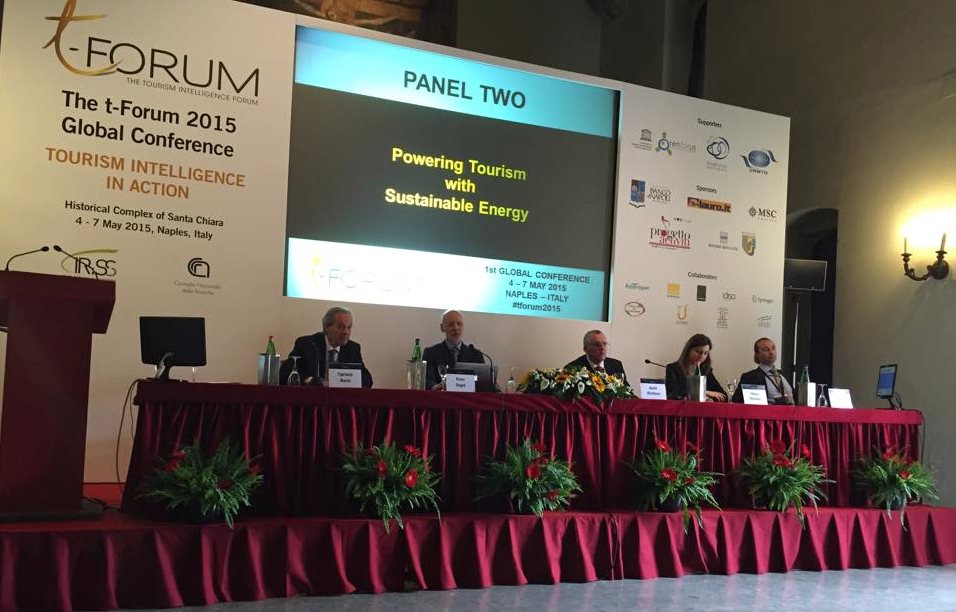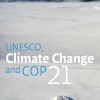Powering Tourism with Sustainable Energy
RENFORUS contribution to t-FORUM 2015 Global Conference: Tourism Intelligence in Action. Naples, Italy, May 2015.

Panel session at the Historical Complex of Santa Chiara. (left to right): Cipriano Marin. Unesco Center of Canary Islands, Peter Dogsé, UNESCO-MaB, Bertil Klintbom, Region Gotland, Chiara Ronchini, ICOMOS and Emanuele Taibi, IRENA. © t-Forum
Energy is at the heart of tourist activities. If we look in depth, energy is the golden thread that connects competitiveness of tourism, increases public welfare in the destinations, and the environment.
Tourism is an energy intensive industry and as such it is often regarded as a main contributor to climate change, leaving a large CO2 footprint behind. It does not need to operate in this way.
In 2007, the Davos Declaration recognized the urgent need to promote and undertake investments in energy-efficiency tourism programmes and use of renewable energy resources. Eight years later we find in the United Nations Decade of Sustainable Energy for All. The time has come for an urgent shift from fossil fuels to renewable energy, and entire tourism sector should play a key role in achieving its objectives.
The past decade has set the wheels in motion for a global transition to renewables, but a concerted and sustained effort is needed to achieve it. Analyzing trends of recent years, significant improvement is observed in energy efficiency in the tourism activities, especially in the hotel sector. But this is in contrast with the low penetration of renewable energies, considering the innovative capacity and potential of the tourism industry.
Now, the question is no longer whether renewables have a role to play in the provision of energy services for tourism, but rather how we can best increase the current pace to achieve a 100% renewables future with full energy access for all activities.
Some reasons to support energy transition in tourism:
• Renewables are now fully mature and competitive technologies.
• Solutions are available today at any scale. Actually we can produce energy in a decentralized way, adapting to any requirement.
• Is the only option that at the same time can increase the security of energy supply, prevents the risks of energy dependence in several destinations and respect the environmental commitments.
• The renewablescreates new opportunities for business between the tourism industry, local communities and developers.
• Many initiatives based on renewable energies can become new tourist attractions or attractors.
Extracted from speech of the chairman of the panel, Cipriano Marín, SG UNESCO Center of the Canary Islands / RENFORUS.
 Sustainable Energy and UNESCO sites
Sustainable Energy and UNESCO sites
Renewable energy and low carbon ambitions come often naturally for UNESCO sites, and this for a good number of reasons:
1. Firstly, Climate change has negative impacts on sites. Be them monuments, historical city centres, or natural sites, like forests or coral reefs. There are many research projects and stories in the press about the negative impacts the last years. Such as sea level rise. This is seriously bad news from a tourism perspective.
2. Secondly, by reducing carbon footprints, that is reducing emission of carbon dioxide to the atmosphere, through energy efficiency and renewables, we help promote a clean, healthy local environment and green economies.
3. Thirdly, Working towards carbon neutrality can help reach other important goals as well, like biodiversity conservation objectives.
4. Finally, by providing communities previously without access to energy, renewable energy is also critically important for development, and building new, innovative tourism service opportunities.
Renewable energy is therefore a strategically important ally for the tourism sector, and UNESCO sites can help make this alliance effective and successful.
Specifically, this includes that UNESCO sites can help:
- Promote the sustainable use of renewables throughout the tourism delivery chain: transport, accommodation and leisure activities;
- Promote sustainable generation of renewable energy, through solar, wind, and hydro power and through production of biofuels;
- Broker deals with local communities that might be reluctant to host renewable energy installations, by bringing them additional benefits; but also help protect communities from unsustainable renewable energy projects, say for example by policies that can stop renewable energy projects that would seriously distort the cultural landscape.
- Promote programmes for carbon offsetting, including project activities to capture carbon through the protection or extension of forests, or turning waste into gas.
Extracted from the intervention of Peter Dogsé, Co-Chair of UNESCO’s Task Force on COP21 and Climate Change and Programme Specialist with UNESCO’s Man and the Biosphere (MAB) Programme.
More information:
t-FORUM 2015 Global Conference: Tourism Intelligence in Action
















